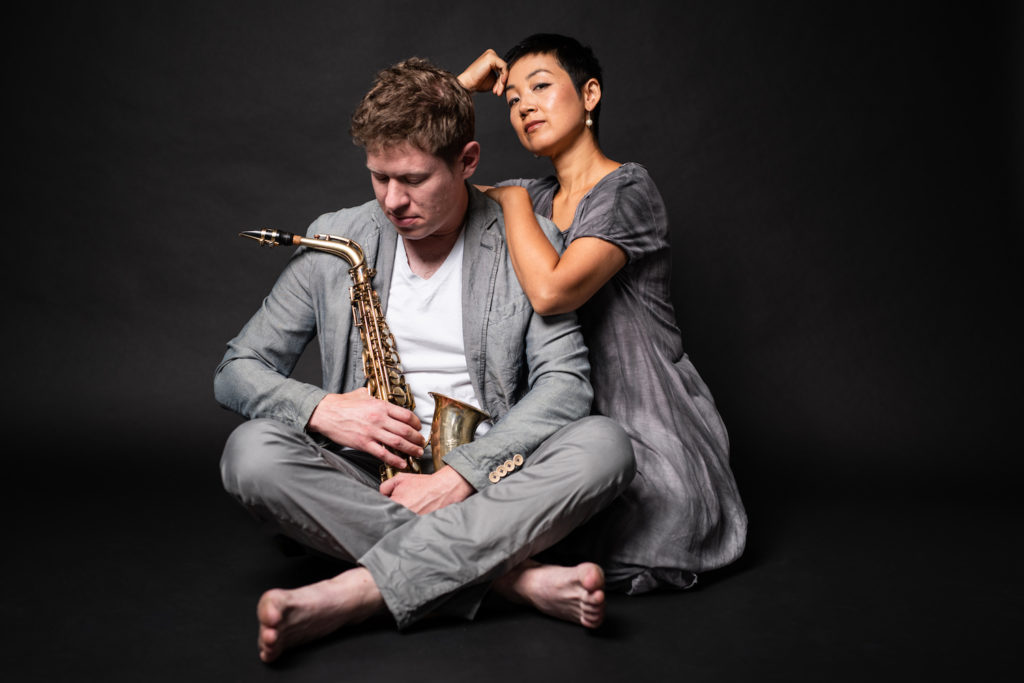There is a woman lighting candles in the darkness, singing of love and loss, one voice echoing in a world of language. And a cherished saxophone.
Written and evolved in the first decade of a new millennium, Canadian composer Ana Sokolovic’s haunting song cycle, Love Songs, premiered in 2008 as stark mono opera presented by Toronto’s sadly departed Queen of Puddings Music Theatre, electrified critics and audiences alike from the moment of first contact. Over a decade later, revised and reset as a semi-staged concert piece for soloist and saxophone, the recharged iteration, Love Songs – A Saxophony, has lost none of its power to stun and amaze as witnessed by the newly generated 60-minute jolt of high voltage musical magic directed by Michael Hidetoshi Mori co-produced by Tapestry Opera and New Music Concerts currently streaming on YouTube.
Ritualistic, hypnotic, touchingly human, Love Songs – A Saxophony sweeps back and forth across the interface of wakefulness and evanescence, reality and dream, sorrow and spirit. Taking as her reference point an intensely expressive collection of love poems, Sokolovic embarks her soloist on a journey of universal consciousness, a search for solace sparked by the remembrance of what once was — maternal love, a child’s love, love of a daughter, love of a brother, love torn in two by despair. Snatches of nursery rhyme share space in Sokolovic’s strikingly prismatic tonal sketches with fragments of ode, particles of requiem, fractured lament, written in English, Serbian, Gaelic and French concluding with a vivid, harrowing funereal passage by Catullus in Latin.
I give you my hand!/I give you my love more precious than money, sings soprano Xin Wang referencing the final stanza in Walt Whitman’s epic Song of the Open Road. In Dán do Lara, 10 (Poem for Lara, 10), 20th century de facto Irish poet laureate, Michael Hartnett, adds his own voice. Fuinseog trí thine,/gruaig do chinn/ag mealladh fuiseoige/le do ghlór binn (“An ash tree on fire,/the hair of your head/coaxing larks/with your sweet voice”). Turn of the century Québécois symbolist, Émile Nelligan speaks across the ages in Ma mère. Quelquefois sur ma tête elle met ses mains pures,/Blanches, ainsi que des frissons blancs de guipures. (“Sometimes she puts her hands on my head, white, pure, like shutters of lace”). Atque in perpetuum, frater, ave atque vale, concludes Catullus. (“And for ever and ever, brother, all hail and farewell.”)
I love you — Sokolovic’s defining refrain for all humanity throughout all earthly time, a reaching out for a reassuring statement of being proclaimed in a hundred different languages — punctuates each and every episode in the collective order of events in this shimmering expression of life, desperately fleeting, reassuringly eternal.
Sensitively performed by husband and wife artists, saxophone marvel Wallace Halladay and the unfailingly venturesome Xin Wang, Sokolovic’s highly textured score positively soars as the two fling bar after bar of chromaticism and intricate harmony skywards in an astonishing demonstration of superbly attuned collaboration.
Wondrously performed, glowingly realized, Love Songs – A Saxophony evokes deep emotion, a reminder of all that we have lost in these shattered times. And the preciousness of all that remains.


